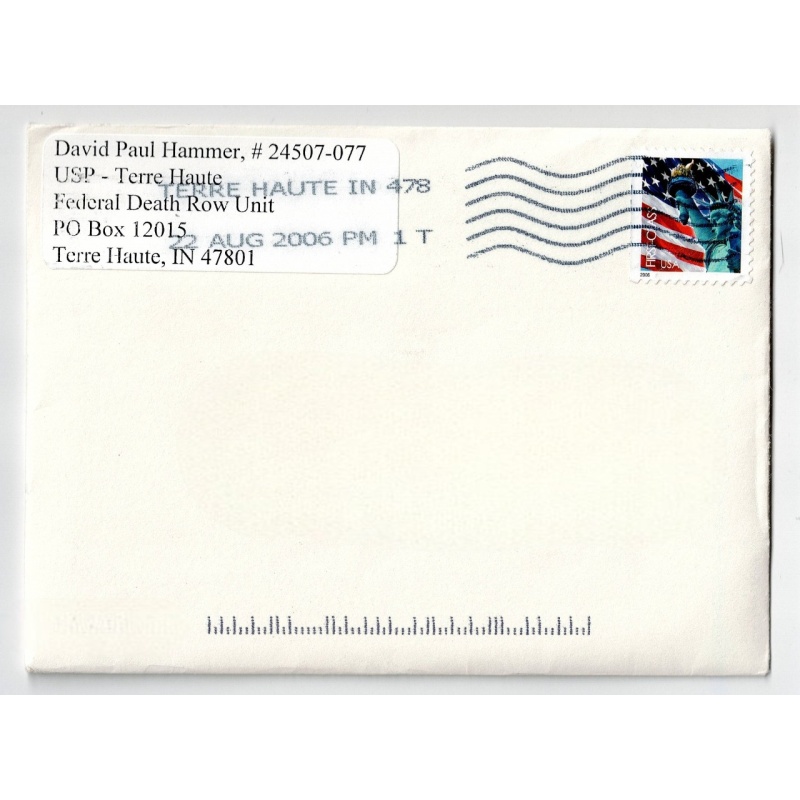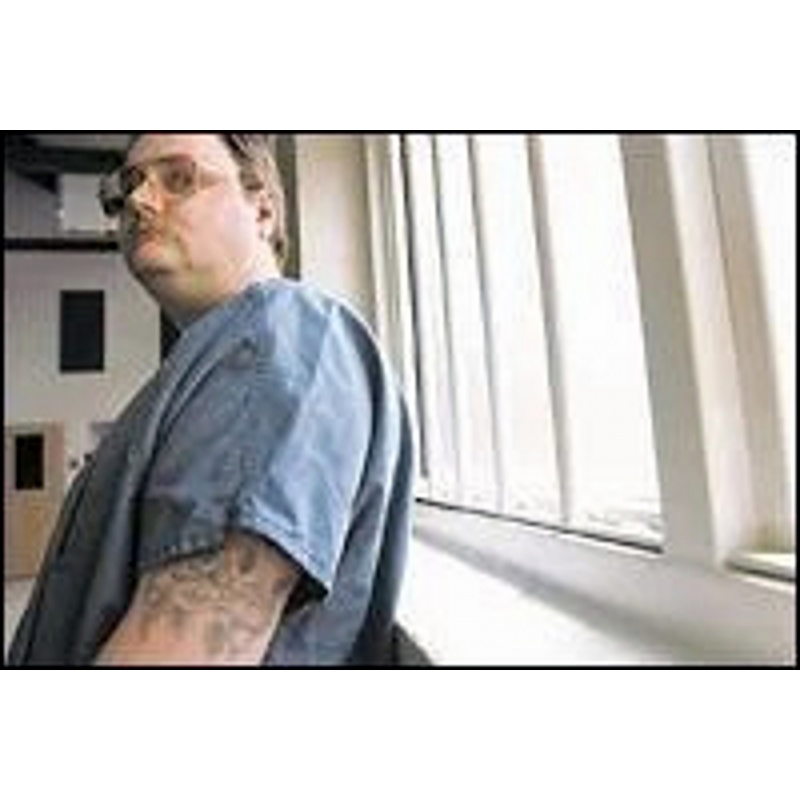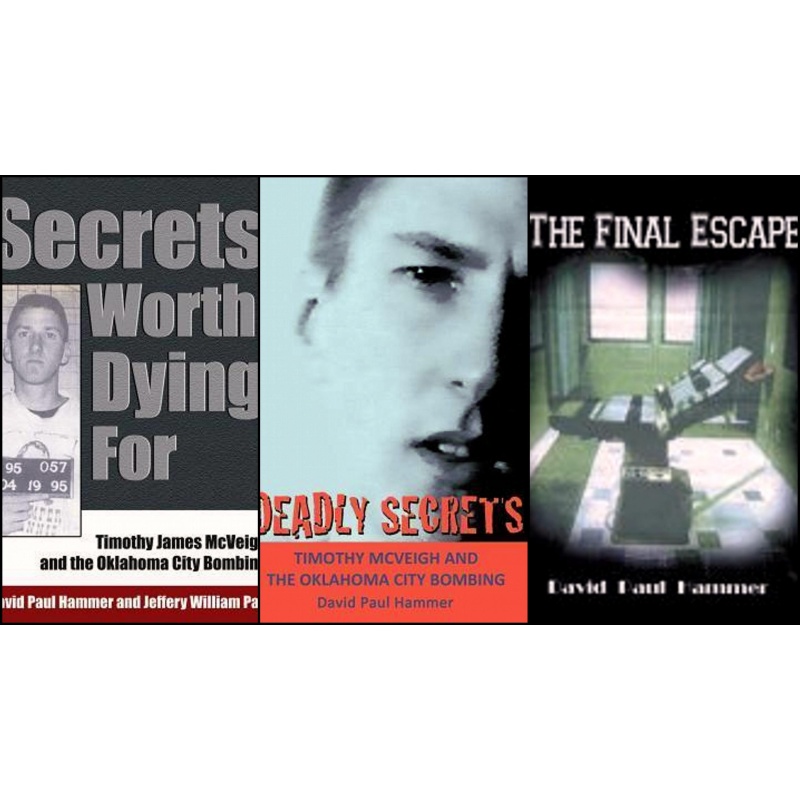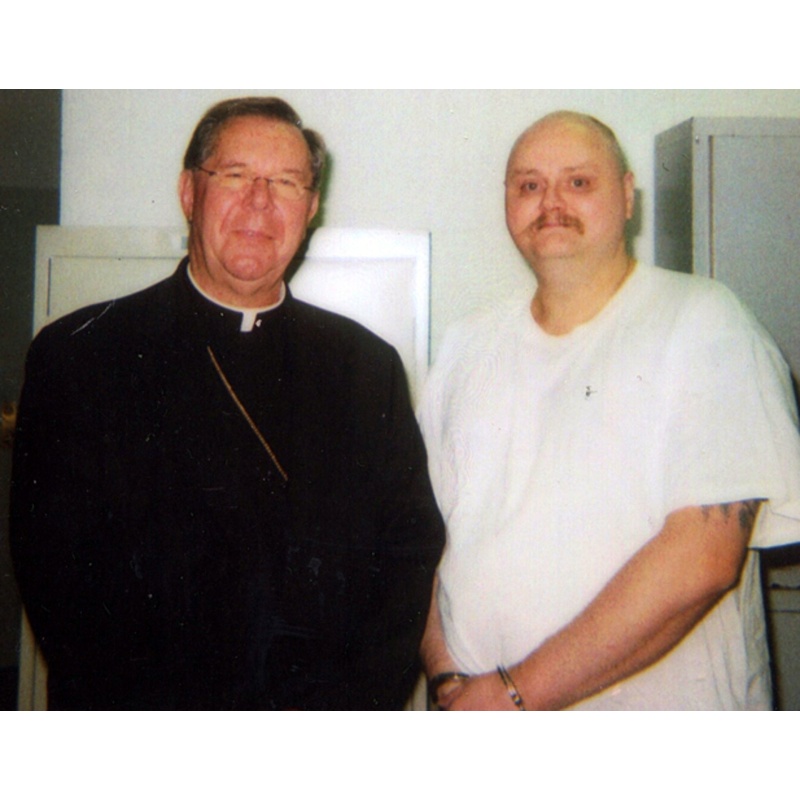DAVID PAUL HAMMER | ‘Classic Con Man, Second-Rate Killer’ Dies In Prison Decades After Avoiding Death Penalty | Was Serving His Sentence At The ADX Florence, Colorado Until His Death At Terre Haute In 2019 | Baronial Autographed Greeting Card Signed
LongfellowSerenade 27
David Paul Hammer (October 9, 1958 -- June 7, 2019 | age 61) was an American murderer and a prisoner on death row at Terre Haute prison, Indiana. He was sentenced to death in November 4, 1998 for the murder of his cell mate, Andrew Marti. Hammer had achieved media fame for his appeals against his sentence and against the death penalty itself.
In April, 1996, in the SHU in the USP Allenwood, Hammer strangled his cellmate Andrew Marti (aged 27) to death using a piece of homemade cord. Writing on a website dedicated to his case in 2001, Hammer could not “attribute any motive” to his actions.
Hammer was sentenced to death by lethal injection on November 4th 1998, at Williamsport, Pennsylvania, having pleaded guilty to the murder. His execution date was set at January 14th, 1999 at 10:00 am
I keep wondering how long until my own date with the executioner will arrive,
I wish I were dead right now, but I'm not. Death would be a welcome relief.i
i Blanco, J. (2023) David Paul Hammer | Murderpedia, the encyclopedia of murderers, Murderpedia.org. Available at: https://murderpedia.org/male.H/h/hammer-david-paul.htm (Accessed: 21 March 2023).
$20.00
- Postage
-
$0.00 to United States
Standard Shipping
Get Additional Rates
- Select Country
- Zip/Post Code
- Quantity
Description
David Paul Hammer. Autographed Greeting Card Signed. 4 x 5.5 in Baronial. Pmk: August 22, 2006. SEALED. Contents unknown. Pristine.
Summary
David Paul Hammer (October 9, 1958 – June 7, 2019) was an American federal prisoner serving life without possibility of parole. He was sentenced to death on November 4, 1998 for the murder of his cell mate, Andrew Marti. He was also a writer and anti-death penalty advocate who achieved media fame for his 2004 autobiography The Final Escape, Secrets Worth Dying For (his 2004 first book about Timothy McVeigh), and 2010's Deadly Secrets: Timothy McVeigh and the Oklahoma City Bombing, based on information from when McVeigh was a then-fellow death row inmate. Hammer was also known for his appeals against his 1998 federal death sentence and against the death penalty itself. Hammer's federal conviction was vacated in 2005 for the government’s Brady violation (failure to disclose exculpatory or mitigating information it had). After 16 years in isolation on federal death row isolation at Terre Haute prison in Indiana, in 2014 the court resentenced him to life without parole. He was serving his sentence at the ADX Florence, Colorado until his death at Terre Haute in 2019.
Life in prison
At the time of his resentencing, Hammer had long been classified as a BOP Medical Care Level 3 inmate. In early 2015, after 18 years in solitary confinement, BOP transferred Hammer directly to USP-Tucson, one of the few BOP prisons able to accept Care Level 3 inmates. Within a few months, they hospitalized Hammer for a partial amputation of his right foot for osteomyelitis, a bone infection. The amputation did not cure his condition, and BOP reclassified him to a Care Level 4. In early 2016, BOP transferred Hammer to MCFP-Springfield, a medical prison. In 2017, a further right foot amputation removed the ulcerated area. He also suffered a minor stroke in August 2017. Hammer’s blindness became almost total. In March 2018, BOP moved Hammer to ADX Florence, Colorado after he strangled an inmate. This is an administrative maximum or “Supermax” federal prison in Florence, Colorado, also known as the “Alcatraz of the Rockies.”
Except for two brief escapes during the 1980s, Hammer was continuously incarcerated for over 40 years. Hammer served 30 of those years in solitary confinement isolation, and 16 years on death row.1
Archiving Protocol:
Handled with White Gloves ab initio
Photo Pages/Sheet Protectors: Heavyweight Clear Sheet Protectors, Acid Free & Archival Safe, 8.5 x 11 Inches, Top Load
White Backing Board – Acid Free
Shipping/Packaging:
Rigid Mailer 9.5 x 12.5 inches. White, self seal, stay flat, kraft
cardboard, no bend. Each rigid mailer is made of heavy cardboard,
which has strong resistance to bending and tearing. Thicker that the
USPS mailers. Shipping cost never more than it absolutely has to be
to get it from me to you.
1 Inmates with Care Level 3 needs are fragile outpatients who require frequent clinical contacts, and/or who may require some assistance with activities of daily living, but do not require daily nursing supervision.
Payments & Returns
- Payment Methods
- PayPal, Money Order
Postage & Shipping
- Item Location
- 54911, Wisconsin, United States
- Ships To
- Worldwide
- Pick-ups
- No pick-ups
- Returns Accepted
- No







-500x500.jpg)

-500x500.jpg)